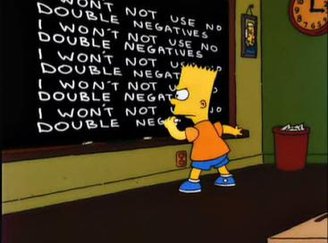Ask a Brit how they’re feeling, and likely as not they’ll reply, “Not too bad, could be worse”—meaning, “I’m doing just great!” Inquire after their trip to Paris, and you’ll probably hear, “Not too shabby.”
I’ve noticed that such verbal irony—the proper term is litotes—is far more common on the other side of the Atlantic than over here. Well, kind of. Litotes, used for emphasis as a double negative, is alive and well in some dialects in the US, notably in Black (“African American Vernacular”) English. The impetus for this column comes from recently reading Brian Azzarello’s graphic novel 100 Bullets. I go along with the reviewer for Chicago Sun-Times: “One of the greatest works of crime fiction in any medium.” Some lines from the Azzarello’s colorful cast:
- “You don’ owe me a thang no mo’.”
- “I never killed nobody.”
- “He didn’t give me no reason.”
And going for the triple:
- “I ain’t got no family no more.”
Some grammarians will no doubt object that double negatives are (1) “bad” English and (2) illogical: don’t two negatives make a positive, the same way they do in arithmetic?

Are triples are okay?
When I say, “some grammarians,” I’m referring to my late dad. Many years ago, Louisa took me to meet her “farm cousins” in rural South Carolina, and a few weeks later we were visiting my folks in England. “Some of them had such thick accents I had trouble understanding them,” I told my dad. He paused. “But they understood you, of course.” “Um, why’s that, dad?” “Because you speak proper English!”
Historically, English has long used double—and triple—negatives for emphasis. In the Canterbury Tales, Chaucer says of the Friar,
Ther nas no man no wher so virtuous. (There never was no man nowhere so virtuous.)
And Shakespeare 200 years later, in Love’s Labour Lost:
Holofernes: Via, goodman Dull! thou hast spoken no word all this while.
Dull: Nor understand none neither, sir.
The “rule” about avoiding double negatives seems to have arisen in Bishop Robert Lowth’s A Short Introduction to English Grammar with Critical Notes (1762): “Two negatives in English destroy one another, or equivalent to an affirmative.” (He may have been emulating Latin, which doesn’t use the construction.) Lowth probably would have had a fit had he been around in the seventies for Floyd or the Stones:
“We don’t need no education.”
“I can’t get no satisfaction.”
You’ve only got to cross our southern border to realize how common double negatives are in Spanish: ¡No necesito nada! = I don’t need anything! Similarly, according to Wikipedia, double negatives (“negative concord or emphatic negation”) are used in Portuguese, Persian, Russian, Neapolitan, Italian, Bulgarian, Czech, Polish, Afrikaans, Hebrew, and Ukrainian. Even Chinese and Japanese use constructions like “I cannot not go” and “Not doing wouldn’t be proper” respectively.
But okay dad, while “proper English” is an outlier in the global context, I don’t disagree that you’ve got to be careful using double negatives. After all, I wouldn’t say no if someone offered me a free trip to Paris.
CLICK TO MANAGE